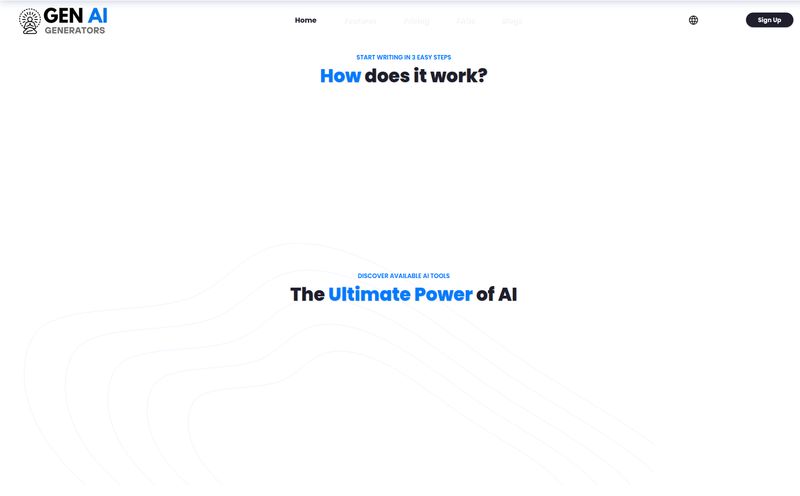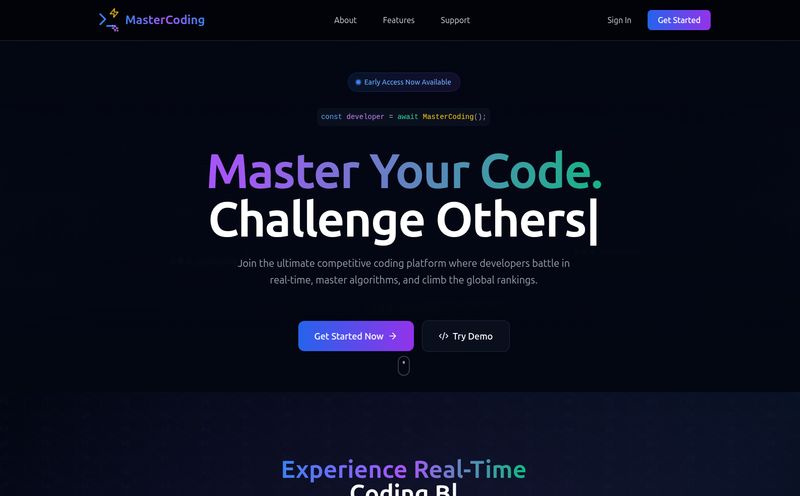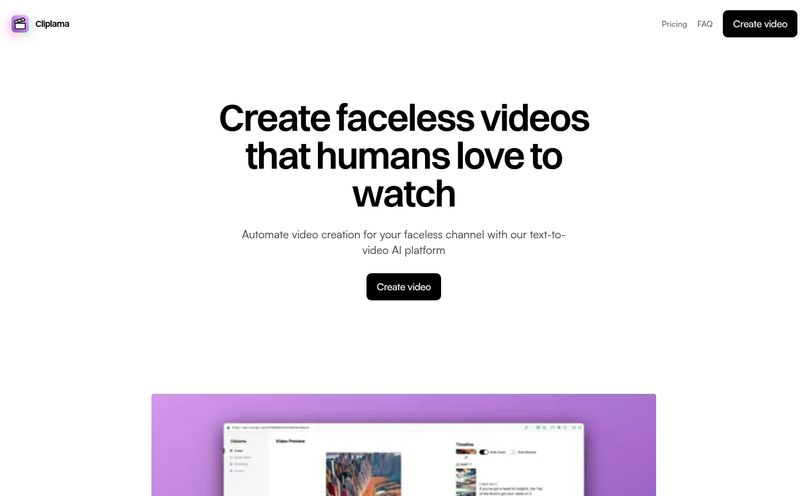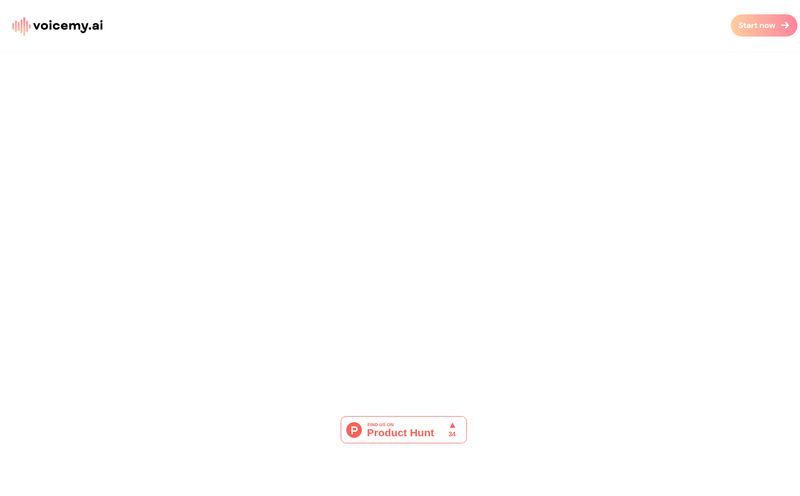The world of AI text-to-speech has gotten... crowded. Every week, it feels like a new tool pops up promising to be the most realistic, the most human, the best. I've tested a ton of them, from the big household names to the scrappy upstarts. Some are impressive, many are just okay, and a few are downright terrible. So when I heard about Fish Speech, I was intrigued, but also a little skeptical. Another one? Really?
But then I saw who was behind it. The platform is backed by the original creators of So-VITS-SVC and Bert-VITS2. Now, if you're not a complete AI audio nerd like me, those names might not mean much. But for those in the know, that's like hearing that a new car company was started by the original engineering team behind the Porsche 911. It's a signal. A big one. It means the people building this thing have serious, grassroots credibility. They're not just marketers slapping a fancy UI on a generic model; they're the ones who helped write the playbook. So, I decided to give it a proper look. And honestly? I'm glad I did.
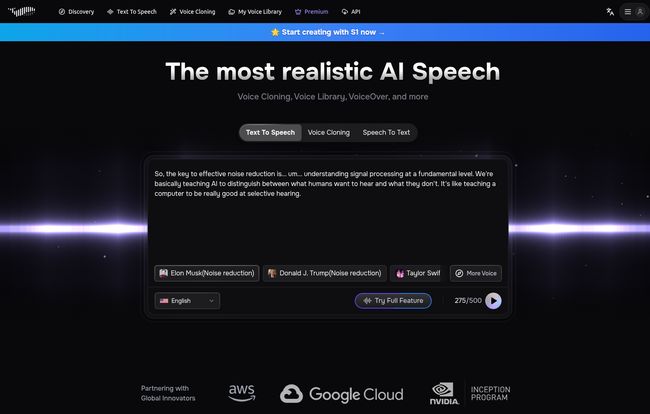
Visit Fish Audio
So, What Exactly is Fish Speech?
At its core, Fish Speech (and the broader Fish Audio platform it's part of) is a text-to-speech and voice cloning tool. You give it text, it gives you back audio. Simple enough. But the magic is in the details. The big headline feature is its ability to clone a voice from just 15 seconds of audio. That's not a typo. Fifteen seconds. You can upload a short, clean sample of a voice, and the AI will synthesize new speech that supposedly maintains the original timbre, style, and even accent.
This isn't just another generic TTS service. It’s built on a foundation that prioritizes realism and customisation. The connection to So-VITS-SVC is the key differentiator here. That open-source project has been a favorite in the AI voice community for a while because of its power and flexibility. Fish Speech feels like the commercial-grade, user-friendly evolution of that project. It's taking that raw power and putting it into a package that (almost) anyone can use, backed by the robust infrastructure of partners like Google Cloud and AWS.
The Standout Features That Genuinely Impressed Me
I've seen a lot of feature lists. They often sound better on paper than they work in practice. But Fish Speech has a few things that really stand out from the noise.
Jaw-Droppingly Realistic Voice Cloning
Let's just get to the main event. The voice cloning is good. Frighteningly good, at times. The platform's homepage even features pre-made models of public figures like Elon Musk and Taylor Swift, which is a bold move that shows their confidence. But the real test is with your own audio. The claim is that it preserves the unique character of the voice, and from what I've heard, it does a remarkable job. The intonation, the pacing... it feels less robotic and more organic than many competitors.
One testimonial on their site from AI Lookup caught my eye, stating that they compared Fish Audio directly with ElevenLabs and found Fish Audio "outperformed in voice authenticity and dramatic improvement." That's a massive claim. ElevenLabs is pretty much the benchmark for many people, so to see a direct comparison like that is telling. It positions Fish Speech not as a follower, but as a direct competitor for the throne.
A Massive, Growing Library of Voices
This is where things get interesting from a community perspective. The site boasts over 200,000 user-uploaded voices. This transforms it from a simple tool into a living ecosystem. Want a specific type of accent for a project? Need a particular vocal style for an ad read? There's a good chance someone has already created and shared a model you can use. It's a collaborative approach that I find really compelling, and it gives creators a massive palette to work with right out of the gate.
Going Global with Cross-Lingual Tech
The platform isn't just for English. It has powerful cross-lingual capabilities. This means you can, in theory, take a voice cloned from an English speaker and have it speak fluently in Japanese, Spanish, or a host of other languages, while retaining the core vocal identity. For global content creators, podcasters, and advertisers, this is a huge deal. It breaks down language barriers in a way that used to require hiring multiple voice actors. I've seen this feature in other tools, but the quality here, tied to the underlying model, feels more promising.
A Quick Look at the User Experience
The main interface is pretty straightforward. You've got a big text box, a dropdown for the voice model, and a play button. Can't get much simpler. However, I can see how some of the more advanced features, like building your own custom models, might have a bit of a learning curve. The website itself is sleek and modern, though I did notice some parts, like the UI for managing custom voices, felt a little less polished than the main generation page.
And here’s a critical piece of advice that applies to ANY voice cloning tech: the quality of your output is directly tied to the quality of your input. It's the classic garbage in, garbage out principle. If you feed it a noisy 15-second clip recorded on a laptop mic in a cafe, you're going to get a muffled, echoey result. For the best results, you need clean, clear, isolated voice data. It's not a magic wand that can fix bad audio; its a synthesizer that replicates what it's given.
The Elephant in the Room: How Much Does Fish Speech Cost?
So, what's the damage? How much will this bleeding-edge tech set you back? Well... that's a good question. As of writing this, the pricing information isn't publicly available. The "Premium" link in their navigation leads to a 404 error page.
This isn't necessarily a red flag. It's actually quite common for new, powerful platforms like this. It could mean a few things:
- They are still in an open beta or early access phase, refining the product before setting prices.
- They are focusing on an enterprise or API-first model where pricing is custom-quoted.
- They're simply still building out the billing page!
My guess is it will likely be a credit-based system, similar to other AI media generation tools. For now, you can sign up and try the features, which seems to be free to a certain extent. I'll be keeping a close eye on this and will update this article as soon as official pricing is announced.
The Not-So-Perfect Bits
No tool is perfect, and it wouldn't be an honest review without pointing out a few potential downsides. First, the reliance on input quality can be a hurdle. Not everyone has access to studio-quality recording equipment, which can limit the potential for some casual users. Second, while the 15-second requirement is impressive, it's still a requirement. You need at least that much clean audio to get started. Finally, as mentioned, the user interface, while mostly clean, has some areas that could be a little more intuitive for absolute beginners. These are minor gripes in the grand scheme of what the platform can do, but they're worth mentioning.
Frequently Asked Questions about Fish Speech
- What is Fish Speech?
- Fish Speech is an advanced AI platform for text-to-speech (TTS) and voice cloning. It's known for its high-realism and for being developed by the creators of the popular open-source project So-VITS-SVC.
- How much audio do I need to clone a voice?
- You need a minimum of 15 seconds of clean, clear audio of the target voice to create a custom voice model.
- Is Fish Speech free to use?
- Currently, you can sign up and use the features on the platform, suggesting a free tier or trial period. However, official pricing for premium features or higher usage has not been announced yet.
- Who is this tool best for?
- It's a fantastic tool for content creators, podcasters, video producers, developers (with a promised API), and anyone needing high-quality, customizable voiceovers without hiring voice actors. Its cross-lingual features are also a huge plus for those with a global audience.
- How does Fish Speech compare to other tools like ElevenLabs?
- It's a direct competitor. While both are excellent, Fish Speech's strengths seem to be in its technical roots (coming from So-VITS-SVC), the authenticity of its cloned voices, and its large community-driven voice library. Some users report it has a more 'dramatic' and less polished, but potentially more authentic, output.
Final Thoughts: A Seriously Powerful Tool for a New Era of Audio
So, is Fish Speech the real deal? In my opinion, yes. It's more than just another face in the crowd. The combination of a world-class technical team, astonishingly realistic results from minimal data, and a growing community library makes it one of the most exciting audio tools I've seen in a while.
It's not perfect, and the current lack of clear pricing is a bit of a mystery, but the underlying technology is undeniably potent. It feels less like a polished corporate product and more like a tool built by enthusiasts, for enthusiasts, that just happens to be powerful enough for professional-grade work. If you're serious about synthetic media or just curious about where AI voice is heading, you owe it to yourself to go to the Fish Audio website and give it a try. This fish is making some serious waves.
Reference and Sources
- Fish Audio Official Website: https://www.fish.audio/
- so-vits-svc on GitHub: https://github.com/svc-develop-team/so-vits-svc
